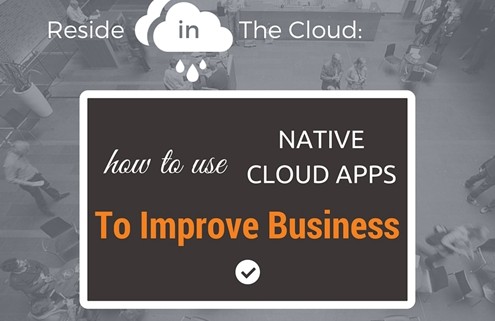Reside in the cloud: How To Use Native Cloud Apps To Improve Business
Owing to the overwhelming benefits of cloud computing, a vast number of firms are flocking to migrate all of their application programs and their corporate data to the cloud to take advantage from substantially lower operating and maintenance costs along with unlimited data storage and flexibility.
The cloud has been a major game changer and firms that undergo a transition to the cloud paradigm are often met with various challenges, pertaining to integration for the most part. The on-premises programs of organizations are rarely built to support cloud and so have to be configured so that they can work properly with the new network model. This has led many companies now to enforce a cloud integration strategy to make their transition smoother by relying on iPaaS platforms and data connectors.
However, businesses can now use programs and applications called native cloud applications that are built to function smoothly under the cloud network without worrying about integration issues. Last month, the Linux Foundation announced the inception of the Cloud Native Computing Foundation. This foundation will seek to proliferate the development of highly advanced native cloud applications to allow businesses easier integration into cloud architectures.
“The Cloud Native Computing Foundation will help facilitate collaboration among developers and operators on common technologies for deploying cloud native applications and services. By bringing together the open source community’s very best talent and code in a neutral and collaborative forum, the Cloud Native Computing Foundation aims to advance the state of the art of application development at Internet scale.”
— Jim Zemlin, Executive Director, The Linux Foundation
What is a Native Cloud Application?
Native cloud applications (NCA) are programs that run and appear similar to OS-based programs but are built specifically for functioning under cloud architectures. NCAs differ from other types of programs in terms of scalability, back-end design computation, and scalability. These applications allow companies to reap the optimal functionality and technical features of a cloud network.
Characteristics of Native Cloud Applications
Since NCAs will be developed by the Linux Foundation, its design will heavily be based on open source code. This open source code will make it possible for new startup companies to develop applications and heavy competition will be encouraged.
Immensely Parallel
Developers should ensure that the programs incorporate techniques of parallelization within data storage and execution.
Provide optimal cloud resource utilization
The developer should also ensure that it makes use of native cloud procedures as well as API’s to make processes simpler and more flexible for business use.
Cross-Cloud integration
The NCA should easily be able to migrate to the cloud architecture without facing any integration issues. Businesses should be able to deploy NCAs across various cloud providers and not face errors and inconsistencies.
Advantages
Although there isn’t sufficient evidence to show how NCAs can benefit businesses from a practical point of view, there are clear advantages in theory, that businesses can make use. The first benefit, as already mentioned previously, is the lack of integration issues that can emerge as firms make a transition to the cloud. Other benefits include:
Personalized apps
The open source code, which is the foundation of NCAs, allows developers to adapt applications according to their own business needs. Businesses do not necessarily have to use off-the-shelf solutions when it can easily be adapted to work seamlessly with their own specific processes and functions and save the need for training their staff.
Saves download times
Since all cloud apps work over the internet, there is no need for businesses to download the applications to be able to use them. Some program installations and updates can take a couple of hours and can disrupt critical activities in the process. However, with NCAs, this is not the case.
Business continuity
Operating system applications often become unavailable if a system outage occurs. This is not the case with NCAs which can be used without interruption. Businesses, therefore, have the advantage of having less risk on their plates through NCAs and can be useful in situations where system failures are expected.
Application of NCAs
Time is the only judge for determining the extent to which NCAs are useful for organizations. However, the proposed benefit of NCAs seems to have garnered positive support from many of the technology companies.
“Cloud native applications are critical for companies that want to scale their business quickly and successfully. Efforts designed to simplify and improve the overall developer experience, such as the Cloud Native Computing Foundation, are a great step forward. We’re excited to be a part of this community initiative to enable new technologies and innovation for developers, as well as our continued commitment to enable users by Open Source.”
— Dave Ward, CTO and Chief Architect, Cisco.
Its application for working seamlessly on any mobile network, for instance, is sufficient for firms to further their BYOB policies in order to drive greater staff productivity and business growth.



